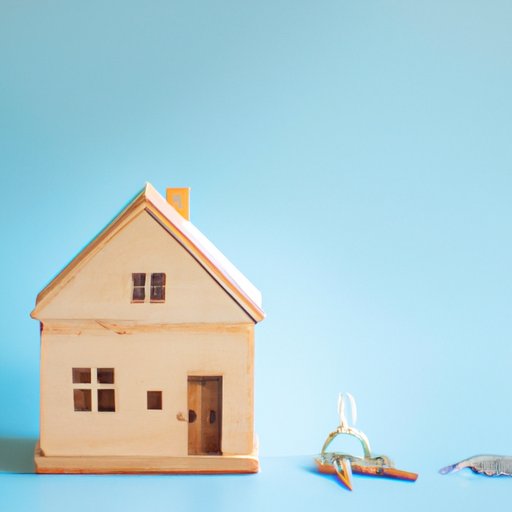
Introduction
Buying a home is one of the biggest investments you’ll ever make. It’s important to know how much house you can afford so you can budget appropriately and avoid overextending yourself financially. In this article, we’ll discuss seven important factors that determine affordability, break down the costs associated with homebuying, and offer tips on budgeting and cutting expenses. We’ll also cover the importance of credit scores, pre-approval, and accounting for hidden costs.
7 Factors to Consider When Deciding How Much House You Can Afford
When determining how much house you can afford, there are several important factors to consider:
- Income: Your income is the most important factor in determining affordability. Lenders typically require a debt-to-income ratio of no more than 43%.
- Debt: Your debt-to-income ratio includes all of your debts, such as car payments, credit cards, and student loans.
- Down payment: The down payment is the amount of money you’ll put down upfront, usually ranging from 3-20% of the total cost of the home.
- Interest rates: Interest rates can greatly impact the total cost of your mortgage, so it’s important to shop around for the best rate.
- Property taxes: Property taxes vary depending on the location of the home you’re purchasing. It’s important to budget for these costs in your monthly payments.
- Homeowners insurance: Homeowners insurance is required by lenders and covers damage to your home.
- Overall budget: You’ll want to factor in your overall budget, including monthly expenses, savings for emergencies, and potential future expenses.
Breaking Down the Costs: How to Budget for Your Dream Home
Homebuying comes with a variety of costs that can add up quickly. These costs include:
- Down payment: Your down payment is the initial investment you’ll make in your home. It’s important to factor in this cost when determining your budget.
- Closing costs: Closing costs include fees charged by lenders and third-party services.
- Inspection fees: Inspection fees are necessary to ensure the home is in good condition before purchasing.
- Appraisal fees: An appraisal is required by lenders to determine the value of the home.
- Moving costs: Moving costs can add up quickly, especially if you’re moving a long distance.
It’s important to budget for each of these costs when determining how much house you can afford. You can also save money by shopping around for the best deals on services and moving expenses. Don’t forget to budget for ongoing expenses such as utilities, maintenance, and repairs.
How Your Monthly Income Plays a Role in Determining Your House Budget
Lenders use your monthly income to determine your affordability for a home. To determine your own budget based on income, follow these steps:
- Calculate your monthly gross income (before taxes).
- Multiply your gross income by 0.28. This represents the recommended maximum percentage of your income that should be spent on housing expenses.
- Subtract your monthly debts from this amount to determine your maximum monthly mortgage payment.
Understand Your Credit Score’s Impact on Home Buying
Your credit score plays a major role in determining your eligibility for a mortgage and your interest rate. To improve your credit score before applying for a mortgage, make sure to:
- Pay your bills on time.
- Pay down credit card debt.
- Check your credit report for errors and dispute them if necessary.
- Don’t take on new debt or open new credit accounts.

What to Cut Out of Your Budget in Order to Afford a House
Cutting expenses can help you save for your down payment and other homebuying costs. To cut expenses, consider:
- Eating out less frequently and cooking meals at home.
- Canceling subscriptions and memberships you don’t use.
- Consolidating debts to save on interest.
- Buying used instead of new.
- Reducing your energy usage to save on utility bills.
Remember, these cutbacks may be temporary, and once you’re in your dream home, you can adjust your budget accordingly.
Determining Your Home Buying Budget Before You Start House Hunting
Before you start looking at homes, it’s important to determine your budget and obtain pre-approval. Pre-approval can also help you stay within your budget by setting realistic expectations. To obtain pre-approval, you’ll need:
- Your employment information and history
- Your income and debt information
- Your credit score and report
- Bank statements and tax returns
The Hidden Costs of Buying a Home: Why Your Budget Needs to Account for More Than Just the Down Payment
Homeownership comes with additional expenses, including maintenance and repairs. To account for these expenses in your budget, consider:
- Emergency fund: Establish an emergency fund to cover unexpected expenses such as repairs and replacements.
- Regular maintenance: Keep up with regular maintenance tasks to prevent extensive repairs down the road.
- Home warranty: Consider purchasing a home warranty to cover major appliances and systems in your home.
Conclusion
Determining your home buying budget is crucial to avoiding financial stress and overburdening yourself financially. By considering factors such as income, debt, down payment, interest rates, property taxes, and homeowners insurance, you can determine how much house you can afford. Budgeting for costs such as down payment, closing costs, inspection and appraisal fees, and moving expenses is also important. Additionally, cutting expenses, improving your credit score, and accounting for hidden costs can help you stay within your budget. With the right budgeting strategies and realistic expectations, you can make your dream home a reality.





